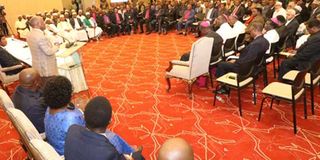Predictable policies ‘good for business’

President John Magufuli addresses religious leaders at State House in Dar es Salaam yesterday. PHOTO | STATE HOUSE
Dar es Salaam. Religious leaders yesterday sent several messages to President John Magufuli including urging him to make the country’s business environment more predictable for the private sector to thrive and absorb an increasing number of job seekers.
In a quick rejoinder, the Head of State said his government was doing all in its power to effectively address the challenge – for which the government needs (their) blessings.
Speaking earlier, the Secretary to the Tanzania Episcopal Conference (TEC), Rev Fr Charles Kitima, called for clear policies that would spur investment – and, eventually, generate more employment opportunities. Going by the 2016 National Bureau of Statistics (NBS) report, 69,639 people were employed that year, with the majority of them being service and shop sales workers.
“Government cannot itself absorb all job seekers, and it is high time that relevant policies were put in place to increase investor-confidence and, hence, jobs creation,” Dr Kitima argued – adding that “investors need to be sure of returns on their investments. But they cannot be competitive enough in the global market if policies are inconsistent.”
His views were echoed by the self-proclaimed ‘Apostle and Prophet’ Joseph Mwingira.
“If we are to take the nation to the next (higher) level, we need long-term sustainable development plans so that people can be aware of their tomorrow,” Prophet Mwingira pontificated.
The Anglican Church of Tanzania Archbishop Maimbo Mndolwa seemed to read from the same script, calling on the government to walk the talk on the agreements made with religious institutions regarding Public/Private Partnership (P/PP) arrangements.
Noting that some P/PP projects proved unsuccessful due to poor support from the government, Archbishop Mndolwa elaborated this by saying that, for example, it was unacceptable for the government to set up a similar project in an area where a P/PP project was already established.
“We did build a hospital at Ifakara in Morogoro Region -- and, surprisingly enough, the government also built a similar facility nearby, hence creating unnecessary competition,” Archbishop Mndolwa lamented.
“It is not a bad idea to build as many hospitals as possible. But, in my humble opinion, it would have been better if the other hospital was built in another area where a hospital was direly needed.”
Rev Eliona Kimaro of the Evangelical Lutheran Church of Tanzania at Kijitonyama in Dar es Salaam suggested that the government should create a suitable environment that would further spur the industrialisation drive.
Rev Kimaro was of the view that Tanzania’s diplomatic representatives abroad should be an effective platform for marketing the country’s products and services in the countries where they are stationed.
“Assured markets would increase investor-confidence – and this is possible if we have strategies that are designed to expand our footprint in the global market,” Rev Kimaro said.
He also said that, for the government to attain its industrialisation goal, more investment should be made in the agriculture sector which engages more than 65 per cent of the country’s population.
“But this is only possible if we will invest more in irrigation farming systems rather than continue to rely on rains, which are unpredictable. We need to use to the maximum the available water resources,” he suggested.
The Christian Council of Tanzania (CCT) chairman, Bishop Alinikisya Cheyo, called on the government to prioritise professions when it comes to generating employment opportunities.
“Some professions like Human Resource and Public Administration – in which one cannot employ oneself – should be given top priority in line with employment offers,” he said.
He also urged the government to address the challenge of water shortage – especially in rural areas.
The representative of the National Muslim Council of Tanzania (Bakwata) at the meeting, Sheikh Mohamed Nasoro, called on the government to employ teachers of Religion as a subject in schools.
In a gesture of goodwill, President Magufuli revealed that tax exemptions granted to religious institutions increased from Sh17.6 billion in 2017 to Sh46.84 billion last year. This is part of the government’s efforts to support the institutions for the good work they are doing for Tanzanians and their country.




